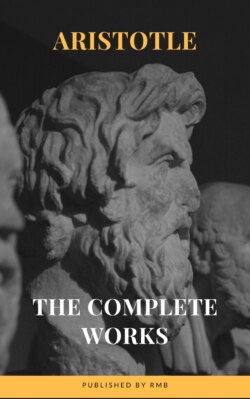Читать книгу Aristotle: The Complete Works - Aristotle - Страница 208
На сайте Литреса книга снята с продажи.
12
ОглавлениеAgain, see if the term of which he renders the definition is a reality, whereas what is contained in the definition is not, e.g. Suppose ‘white’ to be defined as ‘colour mingled with fire’: for what is bodiless cannot be mingled with body, so that ‘colour’ ‘mingled with fire’ could not exist, whereas ‘white’ does exist.
Moreover, those who in the case of relative terms do not distinguish to what the object is related, but have described it only so as to include it among too large a number of things, are wrong either wholly or in part; e.g. suppose some one to have defined ‘medicine’ as a science of Reality’. For if medicine be not a science of anything that is real, the definition is clearly altogether false; while if it be a science of some real thing, but not of another, it is partly false; for it ought to hold of all reality, if it is said to be of Reality essentially and not accidentally: as is the case with other relative terms: for every object of knowledge is a term relative to knowledge: likewise, also, with other relative terms, inasmuch as all such are convertible. Moreover, if the right way to render account of a thing be to render it as it is not in itself but accidentally, then each and every relative term would be used in relation not to one thing but to a number of things. For there is no reason why the same thing should not be both real and white and good, so that it would be a correct rendering to render the object in relation to any one whatsoever of these, if to render what it is accidentally be a correct way to render it. It is, moreover, impossible that a definition of this sort should be peculiar to the term rendered: for not only but the majority of the other sciences too, have for their object some real thing, so that each will be a science of reality. Clearly, then, such a definition does not define any science at all; for a definition ought to be peculiar to its own term, not general.
Sometimes, again, people define not the thing but only the thing in a good or perfect condition. Such is the definition of a rhetorician as ‘one who can always see what will persuade in the given circumstances, and omit nothing’; or of a thief, as ‘one who pilfers in secret’: for clearly, if they each do this, then the one will be a good rhetorician, and the other a good thief: whereas it is not the actual pilfering in secret, but the wish to do it, that constitutes the thief.
Again, see if he has rendered what is desirable for its own sake as desirable for what it produces or does, or as in any way desirable because of something else, e.g. by saying that justice is ‘what preserves the laws’ or that wisdom is ‘what produces happiness’; for what produces or preserves something else is one of the things desirable for something else. It might be said that it is possible for what is desirable in itself to be desirable for something else as well: but still to define what is desirable in itself in such a way is none the less wrong: for the essence contains par excellence what is best in anything, and it is better for a thing to be desirable in itself than to be desirable for something else, so that this is rather what the definition too ought to have indicated.
<
div id="section62" class="section" title="13">
